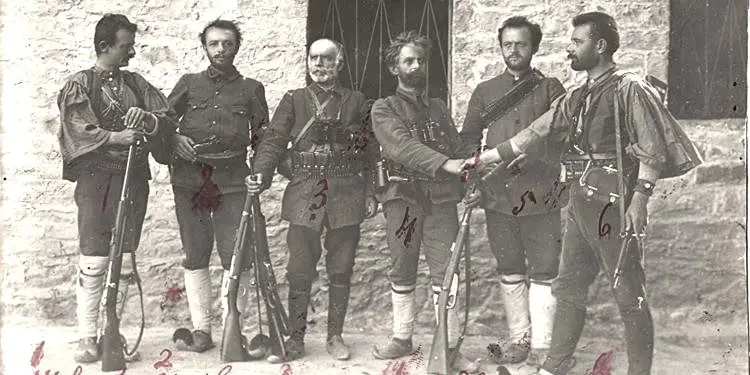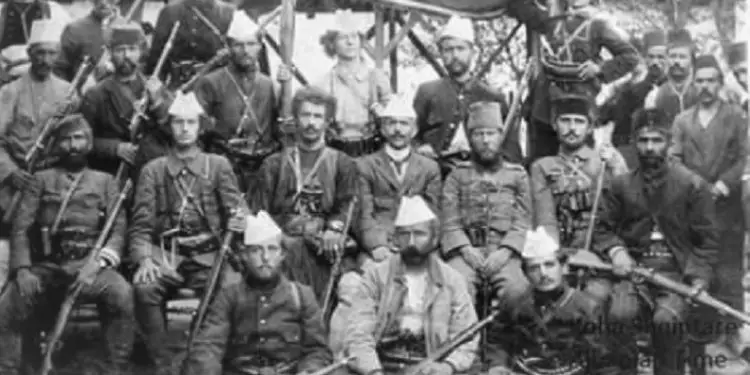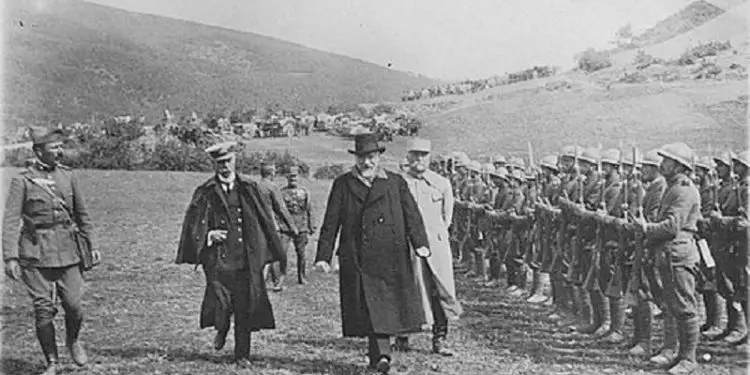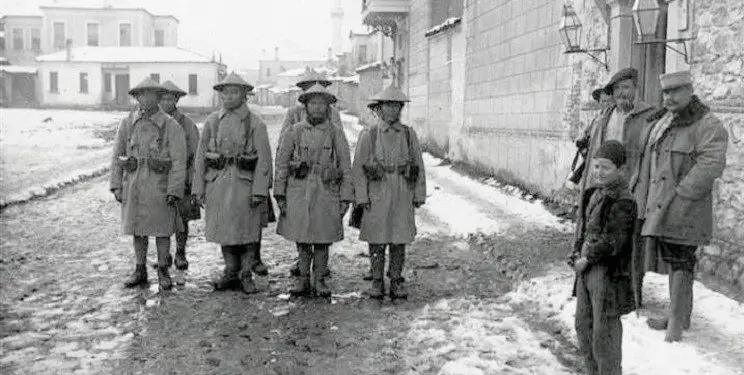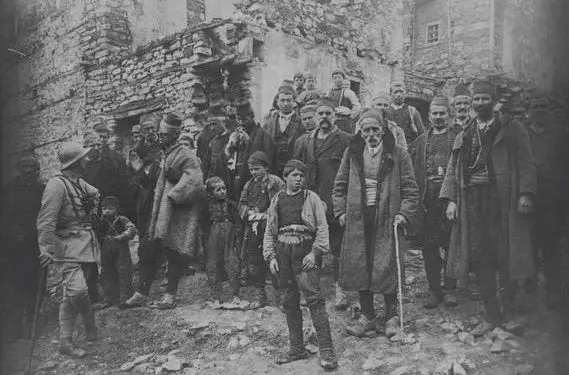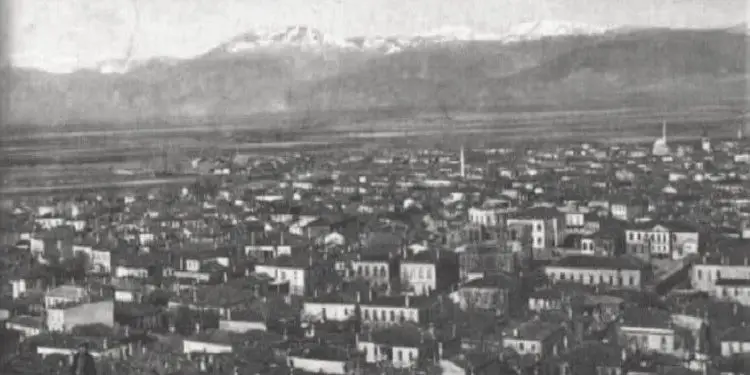By Vepror Hasani
-For the defense of the city, 200 men were killed and hundreds wounded-
Memorie.al / “That night seemed as if it had died. It was nothing like the nights that had passed. A deep silence reigned. The streets were empty and silent, without voices or footsteps. The unusual silence conveyed a continuous anxiety. It seemed as if something was about to happen. All of this resembled the warning of a terrible death. The city of Korçë was half-asleep. The doors of the houses had been bolted from the inside and had not been opened since the evening. There was no rattling of doors and windows, nor was any dog barking heard. The night was crossing its middle, but it continued to remain the same and gloomy. Only the city clock, raising above all the buildings of the Kasaba (town), gave the idea of a giant, watching all around.
Perhaps that night would remain the longest of all nights. The only ones who were not sleeping were the ‘Volunteers’ (Vetëdashësit). Among them was my father, Qerim Butka,” says Gazi Hasanas, the narrator of this thrilling story, a resident of the village of Butkë in Kolonjë, who, besides his memories, still keeps some copies of the newspaper “Koha” that were published at the time.
Part of the Volunteers was also Tefik Butka, Fehim Butka, Mehmet Mydini, Teki Beqillari, Hysen Aliko, etc., all from Butka. The Greek army and the Andartes (Greek irregulars) were expected to attack Korçë. “My father told me all these things,” says Gazi Hasanas, “but I mostly heard them from his brother, Feti Butka, because he lived many years after my father’s death.” (Why Qerim Butka’s descendants now bear the surname Hasanas is explained below).
“The Greeks first entered Korçë on April 7, 1912, and left after 14 months, on February 17, 1914, but the word had already spread that the Greeks would return,” continues Gazi Hasanas, now 86 years old. “Hordes of thousands of people would rush towards it. All those who would not submit or would dare to fire a rifle against them would be stabbed with a knife like cattle.
Neither children, nor women, nor the elderly would be spared. The city slept, shrouded in this great horror. The Volunteers had occupied the entrance gates of the city of Korçë. A part of them was stationed at the place called ‘Çezmat e arave’ (Fountain of the Fields), where the monument of Themistokli Gërmenji stands today.
“My father, Qerim Butka, had also taken a position there,” Gazi Hasanas recalls with nostalgia. “The other part was positioned not far from where Dr. Polena’s houses were, as the city of Korçë extended only up to there at that time. The spread of the news that the Greek would come again had made the Volunteers even more vigilant. My father, Qerim Butka, was part of the ‘sharpshooters’ (qëllonjëtarët), that’s what the group of Volunteers who were selected as ‘snipers’ was called.”
The night continued to be deaf and mute. Frightening too. But a moment came when the city clock broke all the deep silence that had gripped Korçë. It boomed twice in a row and then fell silent. The clock struck 02:00 after midnight. The sound of the clock’s bell had been a loud call: Wake up! The Greeks are coming!
And indeed, they were coming. The Volunteer corps was created on March 5, 1914, by order of Major Snellen Van Vallenhoven. All those who wished to defend Korçë gathered. The Volunteers were placed under the command of Dutch officers. Korçë had to feel safe. Four days later, on March 9, under the leadership of Themistokli Gërmenji and Officer Dhori Harito, the Volunteers organized the first parade, demonstrating before the Governor of Korçë, Vallenhoven, and in all the city’s streets. For Korçë, March 9 was marked as one of its most joyous days. By that day, the number of Volunteers had reached 120 people.”
The newspaper “Koha” gives this description of the creation of the Volunteer corps, Gazi Hasanas explains: “The Sunday that for the first time in the history of Albania’s rebirth, the nationalists were able to see one of the living wishes they dreamed of, will never be forgotten. I say, it will never be forgotten, because all those who took on this duty were Volunteers with all their heart and not forced, out of fear of the whip and the bayonet.
The desired Volunteer fully assures us by the sight of the joyful faces, revives us and adds life to us, when each one (of them) does not delay in fulfilling his duty, proves to us that in Korçë no foreign propaganda could find a place and support, and told us, (exposed) the enemy advertisements that had the courage to do what we know.” (Koha newspaper, March 18, 1914).
The city clock of Korçë boomed three times in a row and fell silent again. The date was April 2, 1914. The calm in the streets of Korçë began to break. At first, a sound seemed to be heard, a light was turned on and off somewhere, then some hurrying footsteps that were extinguished again. The barking of dogs was also heard. The Volunteers all got ready. What was expected was happening. They were facing war. Not long after, all the Volunteers found themselves under a hail of bullets.
The Andartes had attacked them from behind. It was a treacherous war. Pre-prepared with the most devilish details. On February 17, the Greeks had pretended to flee Korçë, but in reality, they had left arms, ammunition, and paid people inside the city. They turned the Girls’ School into a hospital, the Albanian school into a prison, but in reality, they hid the Andartes inside them.
The burst of bullets did not stop; they fired with all kinds of weapons, even with cannons. The Volunteers had no intention of retreating. They had sworn: “We will all die, and we will not surrender Korçë!” The city was covered in smoke and flames. The Andartes were setting houses on fire. From time to time, screams and wails of women were heard, accompanied by the crying of children. No one knew what was happening. Doors bolted from the inside were being smashed open by the Andartes; no one was sure whether they would survive or not.
The volunteer forces were led by the Dutch officers, Major Snellen Van Vallenhoven and Leopold de Ghilard, captain of the volunteer troops, by Themistokli Gërmenji and the sub-prefect Abdyl Ypi. Suddenly, the tolling of the Metropolis bell was heard. The Andartes were trying to convey the message: Korçë is captured! “Korçë is Greek! Surrender your weapons!” The Volunteers, the residents of the city of Korçë, and the people who had come from the villages, fought with spirit. Among the forces for the defense of Korçë, another person appeared who was constantly shooting and repeating with a strange accent – “fire!”
“Only when the Volunteers looked closely at him did they recognize who he was: the American Consul, Major Harold Sherwood Spencer, had come to fight with them. This moment was unbelievable for my father, Qerim Butka,” says Gazi Hasanas. “He forgot the war and began to watch him with admiration. He couldn’t believe his eyes, whether it was true or not. Mr. Spencer was fighting for Korçë, just as if it were his birthplace! That moment made his heart pound fiercely. On this savage planet, Albanians were not without friends and well-wishers. He felt a tear drop from his eye…!”
“And without thinking long,” Gazi Hasanas continues, “my father, Qerim Butka, stood up and began to shoot. He no longer regretted his life. At that very moment, the other sharpshooters also jumped to their feet. Snipers were selected during training. The newspaper “Koha” writes: “On Sunday, April 6, the Volunteer troops of Korçë, under the order of their commander with Mr. Themistokli Gërmenji, went to Boboshticë for strategic maneuvers, all the Volunteers showed an excellent order in the first practice. When they aimed, the following gentlemen from the second squad shot best: Kristo Pema, Qerim Butka, Koli Kaluci, and Zenel Plasa. These maneuvers were visited in Boboshticë by the prefect with many other ladies and gentlemen.” (Koha newspaper, April 17, 1914).
Gazi Hasanas nostalgically recalls another moment from the lives of the Butka elders: “Whenever Qerim Butka, Tefik Butka, Fehim Butka, Mehmet Mydini, Teki Beqillari, Hysen Aliko, etc., came to the village for two or three days, they would do target practice together, who would pass the bullet through a ring; they would cover its opening with a piece of paper. The value of the sharpshooters was evident throughout the fighting.
This later led to the creation of the sharpshooters’ battalion: “The first battalion of Albanian Sharpshooters, (after proving itself earlier in the Bosnian wars, under the energetic leadership of its chairman, Major Holtz), demonstrated the best military qualities, and was openly proven to be a first-class military corps.” (Petro Dh. Harizi, Historia kronografike e Korçës, p. 237).
Now the sharpshooters were running through the bullets, shooting. They had learned this from Major Snellen Van Vallenhoven, who didn’t know how to stop when fighting. Leopold de Ghilard was the same.
This is what the newspaper “Koha” wrote, Gazi Hasanas clarifies: “The spirit in all these battles, and the bravest of the brave in all these attacks, was shown by the officer, Captain Ghilardi, formerly an Austro-Hungarian officer in Zagreb and who, for the past 6 months, has been the commander of the machine gun battalion of Albania. Captaincy and bravery so great that they can only be compared to the manliness and bravery of Alexander the Great and Skanderbeg. His words in these battles were only fire and forward.
Captain Ghilardi with his army was at the front, even firing machine guns himself, with one hand amidst the bullets and ahead of everyone, he attacked the enemy like a lion, whom he broke and defeated with untold skill. The name of Captain Ghilardi is held in the mouths of Albanians as a sacred name, as the name of the greatest brave fighter and liberator of Albania. And the Albanian Kingdom, grateful for his great services, will raise Captain Ghilardi to its highest ranks. Also, the Dutch officer, Captain Doberman, shows great bravery on the battlefield, making battle plans, praising the Albanians, and fighting alongside them” (Koha, May 3, 1914). Part of these fights also became Reimers, captain of the Dutch mission in Pogradec, Major Mustafa Elmazi, Captain Sadik Rexhepi, Doctor Osman Feriti, Lieutenant Ismail Hakiu, etc.
“The Volunteers wanted to end the massacre that was happening as soon as possible,” says Gazi Hasanas. “The Andartes were killing children, old men, and old women. They had cut off the heads of some women with an axe. The streets were washed with blood. The city’s residents were dying with the words: ‘Long live Korçë!’ The Volunteers and everyone else advanced. They were progressing minute by minute. The sharpshooters were sent where the hottest spots were. The fighting lasted throughout the day. The Andartes remained cornered in their positions.
It was a fight to the death. Even the American Consul was fighting with them. The newspaper “Koha” writes: “In these clashes with the barbaric Greek, many people from Korçë also fought, of whom the bravest were the American Consul in Korçë, Mr. Spencer, Ferid Bey (Frashëri), Skëndo Bey (Skënder Pojani), Dr. Haki Mborja, Dervish Filja, Kole Rodhe, Mina Grameno, Llambi Bimbli, Miçe Frashëri, Pandeli Cale, Thanas Visha, and many other volunteers from Korçë.”
The war continued non-stop for 5 days and 5 nights. The news had spread throughout the region of Korçë: “The Volunteers of Korçë are defending the city with blood…!” “The Consul General of America, Mr. Spencer, is with them…!” “Dutch mission officers are also fighting for the defense of Korçë…!” Prince Wied is interested in the fate of Korçë every minute…!”
The word had also reached the commanders of the Albanian detachments. The first to enter Korçë was Captain Kajua. “Get up;” he had told the brave men, “the Andartes are trying to seize Korçë from us.” His brave men, along with Kajo, approached Korçë from above at the place called “Vreshtat” (Vineyards) and opened fire.
The Andartes and Greek soldiers hurried down to escape Kajo’s fire, but Agush Çaushi with his detachment, which had just arrived from Starova, had blocked their path in front. They didn’t have much time to think, they tried to slip silently along the Kolonjë road side, but suddenly they realized they were heading towards death: the detachment of Sali Butka had arrived, led by his son, Gani Butka.
The Andartes were stunned as soon as they heard about Sali Butka’s detachment. They had heard his name before. They tried to break through towards Mborje, where the city’s cemetery is located today, intending to escape towards the Greek border, but their path was cut off by the detachment of Zalo Prodani.
Right at this time, a crowd of Andartes began shooting from the “St. Thanasi” church. All the rifle muzzles were pointed there. After a while, a large explosion was heard, and the “St. Thanasi” church was engulfed in flames. The priests had placed the Greek army’s ammunition there.
After many efforts, the war ended. The number of prisoners was large. On that same day, a commission was set up under the leadership of the prefect Pandeli Vangjeli, sub-prefect Abdyl Ypi, Major Snellen Van Vallenhoven, and Kristo Floqi, who would judge all those who had killed innocent people. According to the newspaper “Dielli,” May 5, 1914, p. 1, the number of dead was 200 people, and the wounded were numerous, but Korçë remained Albanian.
The Ghegs also arrived in defense of Korçë. The terror of the Greeks (Grekomanë) grew even greater. Hajdar Blloshmi, at the head of 300 brave men, said: “We Ghegs have a duty to come to the aid and fight to save and liberate Toskeria (the South) from the barbaric enemy, especially Korçë, because it is known and proven that Albania without Korçë, cannot live and progress as it should.” (Koha newspaper, May 3, 1914). Later, Shaban Blloshmi and the Tirana gendarmerie battalion arrived: “The arrival in Korçë of the Tirana gendarmerie battalion, under the command of Mr. Shaban Adil, emphasizes the brotherhood of the Albanians once more.
The Volunteers of Korçë paid their respects and all the people greeted him with great joy and national songs.” (Koha newspaper, May 3, 1914). Prince Wied sent arms and clothing for the army: “Until today, 400 loads of weapons and 500 loads of cartridges arrive in Korçë from Durrës. The weapons are the best, of the new systems. All the officers we asked were very satisfied…!
Tomorrow, 12 cannons sent by our government from Durrës are expected to arrive in Korçë. The cannons, as we learn, are the most perfect that have been released to date”…! The uniforms ordered by the Government of Korçë for the Korçë army are very pleasing and beautiful. In three days, we express that they will be ready for the army to wear.” (Koha newspaper, May 3, 1914).
“The Greeks attempted to seize Korçë again. And when they were convinced that taking it was impossible, they burned everything. Thousands of families were left homeless. One of them was my father’s family,” says Gazi Hasanas. “They settled in the olive groves of Vlorë. At that time, my father was married and had two children.
His wife was from the famous Malukaj tribe of Kolonjë, but his wife and one of the children did not return from the shores of Vlorë; they remained there forever. Their lives were extinguished due to fevers. Several years later, after completing his studies in Istanbul, his other son also died accidentally.
Upon returning from Vlorë, he again took up the defense of Korçë. He would now fight also in the name of all those who lost their lives in Vlorë. Meanwhile, Qerim Butka married a woman from the great Fejzo tribe of Starje in Kolonjë. One of her descendants is the director Muharrem Fejzo. However, when the dictatorship was established in Albania, Butka was declared a village of Ballists.
Its residents were originally from Frashër of Përmet, they took the surname Butka when they settled there, but many of its residents left the surname “Butka” and everyone took the name of their grandfather as their surname. Qerim Butka’s family took the name of the famous Hasan of Frashër, for whom the Sultan had issued a death sentence.” With these words, the 86-year-old Gazi Hasanas concluded his narrative. Memorie.al




